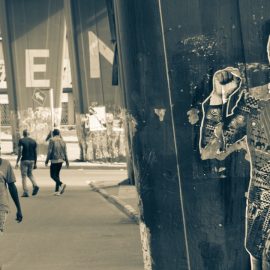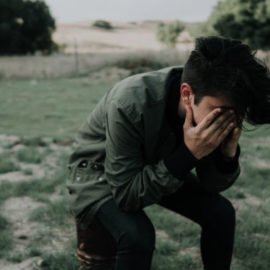

This article is an excerpt from the Shortform summary of "Unbroken" by Laura Hillenbrand. Shortform has the world's best summaries of books you should be reading.
Like this article? Sign up for a free trial here .
What was Louis Zamperini’s PTSD like, and how did he deal with it?
Louis Zamperini’s PTSD stemmed from his time as a POW. During his imprisonment, Louis was subjected to violence, brutality, and humiliation. Louis Zamperini’s PTSD affected his life after the war, and he was able to create a future with the help of his newfound religion.
Louis Zamperini’s PTSD: Haunted by the Past
Toward the end of 1946, Cynthia would learn just how deep Louie’s pain ran. The couple was having dinner in Hollywood with Phil, Fred Garrett, and their wives. It was the first time Louie and Phil had seen each other since Phil’s departure from Ofuna in 1944.
The evening was off to a great start. Everyone was in joyful moods, and the horrors of the men’s pasts seemed far away. But when the dinners came, Fred took one look at the neat pile of white rice on his plate and lost it. He screamed wildly until the dish was taken away, and although Louie was able to calm him down, it was clear that their pasts were never out of reach, and Louis Zamperini’s PTSD continued to haunt him.
Life moved forward for Cynthia and Louie, but the strain of being a good husband weighed on his shoulders. He was 30 years old with no job, no interest in finding one, and living in a friend’s mother’s home. Louie made several small investments with the money he did have and soon earned enough to rent a small apartment in Los Angeles, but the income was always temporary.
Around this time, Louie started to feel his mind turning to the one thing he knew how to do. The return of the Summer Olympics would be in London in 1948, and Louie wanted to be part of them. His ankle seemed healed, and he’d been hiking in the mountains more and more. He decided if he started training now, he could be ready to compete in two years.
Louie began training with gusto. His body felt strong, and his ankle was holding up. But where running once felt natural and freeing, now it felt like a chore he labored through. There was no enjoyment in it. It was a means to an end, and it helped keep the bad thoughts away.
On one training run, Louie wanted to see how fast he could clock a two miles. The first mile went well, but as he headed into the second, he felt pain in his ankle. He knew he should stop, but he couldn’t. By the time he crossed the finish line, he was hobbling. Louie ran those two miles faster than anyone on the coast would that year, but it was all for nothing. He couldn’t walk for a week, and the doctors confirmed that his injury had worsened. His running career and Olympic dreams ended for good.
Without running, Louie was trapped in his mind. Day and night, thoughts of the Bird consumed him. He was terrified of his dreams and started smoking and drinking again to get by. His anger took over, and he lashed out at random strangers. Once, he jumped from his car and punched a man for walking too slowly across the street.
His trauma also started showing up in other ways. If he heard a loud sound, he’d cower and shake on the floor. If someone yelled near him, he’d jump to attention and wait to be beaten, hearing the voice of the Bird. He started to experience flashbacks of being back in the camp and could feel the sensation of lice crawling on his skin.
Nothing worked to bring Louie back to a good place. He was floundering and needed something to hold onto. He found it in a single idea that became his obsession. If he could get back to Japan, he could hunt down the Bird and kill him.
The Aftermath at Home
The men who were held by the Japanese, known as Pacific POWs, suffered greatly after the war. Most of them had lost an average of 60 pounds while imprisoned, and the consequences of their abuse left permanent scars on their lives.
Many came home with tuberculosis, malaria, dysentery, anemia, eye ailments, broken bones, and open sores. Of the Canadian POWs, 84% suffered from neurologic damage, and others had respiratory disorders from long hours of slave labor in factories and mines. Some men were forever physically impaired from poorly set or healed bones, and some went blind from years of malnutrition. For some, the damage was too severe, and they could not be saved.
Many studies were conducted on the health of Pacific POWs in the years and decades following the war. The first two years after the war, Pacific POWs died four times faster than men their age. Twenty-two years later, these POWs were hospitalized for various conditions eight times more often than European POWs.
Mentally, the damage was just as severe. Six years after the war, Pacific POWs were diagnosed with psychoneurosis more than any other disorder. Forty years later, 85% still had PTSD. A 1987 study found that 8 in 10 men had psychiatric impairment, 6 in 10 anxiety, and 1 in 5 depression. These men were 30% more likely to kill themselves than the regular population.
Pacific POWs reported experiencing crippling flashbacks, where they would be transported back to the camps, the sensation as real as the world around them. They suffered from nightmares, night terrors, and violent bursts of aggression. Some couldn’t sleep in beds, were scared of passing planes, hoarded food, and would randomly speak Japanese.
A quarter of all Pacific POWs were diagnosed with alcoholism, and all of them struggled to reclaim a sense of dignity in their lives. Some never would.
Spiraling Out of Control
In Hollywood, Louie heard nothing about the Bird’s death. By fall 1946, Louie was a full-blown alcoholic and suffering from severe psychological distress. His whole world had become dedicated to his mission to kill the Bird. Louis Zamperini’s PTDF was spiraling out of control.
The following years, 1947 and 1948, saw Louie bouncing between various get-rich-quick schemes to fund his trip back to Japan. Many of the schemes were operated by charlatans, who conned Louie out of thousands of dollars. These failures sank Louie deeper into despair.
At home, Louie was tense and quick-tempered. In public, he was aggressive and humiliating. Cynthia’s sadness about the state of her marriage turned into anger and resentment, and she and Louie fought often. Louie became convinced that God was out to get him, and any mention of religion sent him over the edge.
In spring 1948, Cynthia announced she was pregnant. The news made Louie elated, but it also put more pressure on him to succeed, which made him more anxious. Toward the end of the pregnancy, Louie experienced a night terror in which the Bird was beating him with the buckle. He lunged for the Bird and began strangling him. A second later, Louie looked down and realized he was strangling his pregnant wife.
Louie knew he was floundering, but not even the birth of his daughter, Cissy, could bring him out of the darkness. And after Cynthia came home and found him shaking the baby, she prepared to file for divorce.
Awakening
In late 1949, Billy Graham, a young unknown man at the time, came to Los Angeles and performed a miracle. He set up what would become a massive revival residency. In just a month, he went from having 2,000 attendants at his sermons to 10,000. Word spread around the city and made its way to Cynthia. She begged Louie to take her, but he refused, so Cynthia went by herself.
Cynthia and Louie were living separate lives in the same apartment. She was still planning on filing for a divorce, but after she attended Graham’s sermon, she came home and told Louie the divorce was off. She’d had a religious awakening, and she wanted Louie to come next time to experience it. After much persistence, Louie finally agreed to go.
That first night, Louie became angry when Graham asked the congregation how long it had been since they’d prayed. The words poked at a dormant memory fighting to get out, and Louie felt cornered. At the next sermon, which Cynthia again persuaded him to attend, Graham said something that changed everything: “God works miracles one after another…. God says, ‘If you suffer, I’ll give you the grace to go forward.” At those words, Louie’s mind woke up.
Louie saw the morning in the doldrums, when he was certain they’d been led there by divine intervention. He saw the wires entangling his body as the Green Hornet sank and waking to find them inexplicably fallen away. He saw the Japanese plane shooting at their rafts but not one of them hit. He saw the prison camps and all he’d endured. Then his mind landed on the memory scratching at the surface—praying in the raft and promising to serve God if he saved him. Louis Zamperini’s PTSD seemed to respond to this promise to himself over a religious mission.
At that moment, Louie felt rain falling from the sky as he hunkered down in the raft. The flashback stopped, and he was suddenly filled with light. When they returned home, Louie threw out every bottle of alcohol and vice he’d used during the last years of despair. That night, he didn’t dream of the Bird. He would never have a flashback or dream of the Bird again.
Louis Zamperini’s PTSD was left tragically untreated for many years. Louis Zamperini’s PTSD is just one example of how war experiences can affect veterans.

———End of Preview———
Like what you just read? Read the rest of the world's best summary of Laura Hillenbrand's "Unbroken" at Shortform .
Here's what you'll find in our full Unbroken summary :
- How Louie Zamperini was on track to become an Olympic athlete until the war started
- The unbelievable story of his capture as a prisoner of war
- The ultimate fate of Louie and his captors






